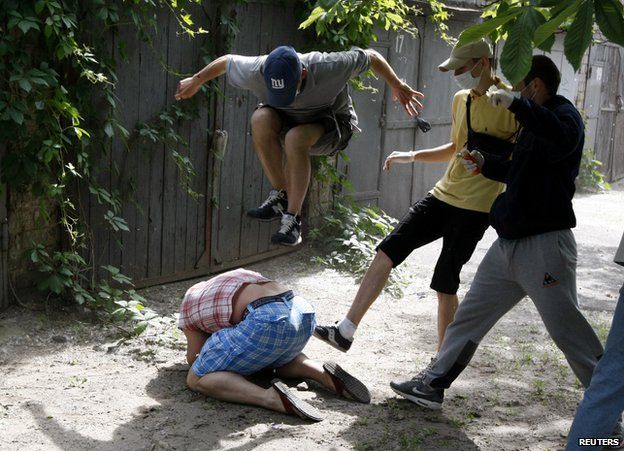Ukraine takes aim against 'gay propaganda'
- Published

The Ukrainian parliament could give final approval next week to a bill that aims to outlaw "pro-homosexual propaganda" - any "positive depiction" of gay people, gay pride marches, or even the screening of a film like Brokeback Mountain.
Critics have described the legislation, which imposes indeterminate fines and up to five years in prison for repeat offenders, as a throwback to the Middle Ages, although it is only a couple of decades since homosexuality was a criminal offence here and in the rest of the USSR.
In some ways, Ukraine is an open and tolerant society. It was the first former Soviet republic to decriminalise homosexuality, in 1991. It has sprouted its own gay rights movement, and gay night clubs operate freely in central Kiev.
But despite this, the bill - which sailed through its first reading last week - enjoys wide backing. All major political parties are united in support, and polls indicate that many Ukrainians support some restrictions on the rights of sexual minorities.
One of the legislation's incubators is the Christian Hope evangelical church in Kiev. Located in a nondescript five-story structure outside the city centre, Christian Hope provides a wide array of educational and charity services, and has established a network of some 150 churches throughout Ukraine. It has also helped collect thousands of signatures in support of three anti-gay bills put forward in parliament this year.
After a rousing service in the church's warehouse-like auditorium focusing on the agonies of sin and bliss of salvation, I meet the chief pastor, Valery Reshetinsky. For him, the fight against homosexuality is a matter of "national security" upon which the survival of the nation depends.
"Here's the issue," says Pastor Reshetinsky, a large-boned man with a slight moustache, tells me. "In a real democracy, my freedom and rights are limited by the freedom of someone else."
In his opinion, freedom of speech for sexual minorities is a violation of what he considers his inalienable right not to have to hear something he finds offensive.
"You can't do everything that you want to do, because there are people who have the exact same rights as you do," he insists.
The pastor goes on to accuse a worldwide conspiracy of Masons, New-Agers, postmodernists and financiers of various nationalities, of imposing ideas that are not "characteristic for Ukraine" on the nation's children.
The first reading of the bill last week unleashed a deluge of condemnation from human rights organisations, both inside and outside Ukraine, who have christened it a "gay gag law". The ban would be a gross violation of European and international conventions, they say, leading to further marginalisation of Ukraine's LGBT (lesbian, gay, bisexual and transgender) community.
It could also damage efforts to stem Ukraine's already stratospheric HIV rate, if, for example, some anti-Aids information were to be prohibited.
It may be no coincidence that a number of gay activists have been attacked in recent months.
The first ever Gay Pride march planned in Kiev was called off at the last minute in May after threats of violence from far-right groups.
Immediately after a news conference announcing the decision, masked assailants kicked and jumped on Svyatoslav Sheremet, head of Gay Forum of Ukraine.
A month later, unknown muggers shouting "Faggot!" assaulted another of the parade organisers, Taras Karasiychuk, on the street as he was coming home at night.
International luminaries have weighed in. At a recent concert to mark the end of the Euro 2012 football championship - co-hosted by Ukraine - Elton John used his stage to denounce the attacks and the pending legislation.
"I plead with you: Stop the violence against gay people," Sir Elton told a cheering crowd of some 100,000 on Kiev's central square.
Supporters of the bill, like Ruslan Kukharchuk, a founder of the local group Love Against Homosexuality, deny the accusation of intolerance. They say they too condemn the violence against homosexuals. What is more, they add, gays are free to do whatever they want "in the privacy of their room".
Kukharchuk, however, has also written about what he calls the "homo-dictatorship" which he claims dominates Western society and persecutes religious, anti-gay proponents like himself. He strives to counter "aggressive" gay propaganda, he says - in other words, public discourse that implies that homosexuality "is normal, is good, is part of democracy".
If passed, the bill would prevent anyone sending out a message that there is nothing wrong with being gay - whether in a newspaper editorial, a public speech or parade. This bill's authors have cited films like Brokeback Mountain as an example.
Another film, Bruno, featuring Sacha Baron Cohen in the role of a gay Austrian fashion designer, was censored in Ukraine anyway. And a few weeks ago, the National Expert Commission for Protecting Public Morality said it would examine complaints from a Christian group about SpongeBob SquarePants and some Disney films.
The new bill could even be so interpreted as to outlaw any public display of single-sex affection, such as kissing and hand-holding, Kukharchuk says. "But it would be up to a court of law to decide if this was propaganda or not."
Despite the formidable pushback - and the threat of physical assault - LGBT activists are undaunted. Karasiychuk, who suffered a broken jaw and concussion in his attack, says gay people cannot retreat into the woodwork.
"We need to be more visible in everyday life. We have to provoke this conversation. Everyone has to ask themselves, why they don't like gays."